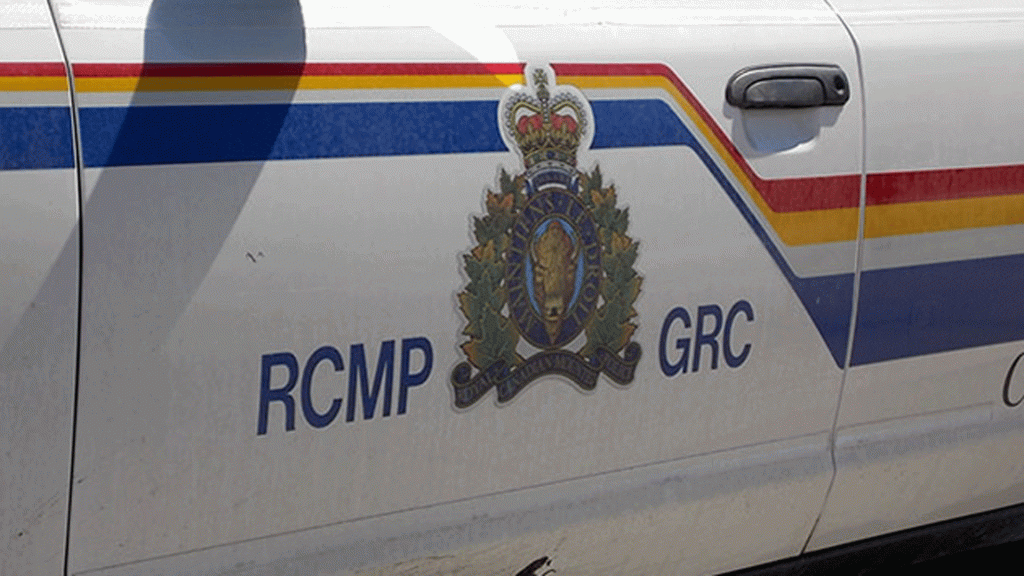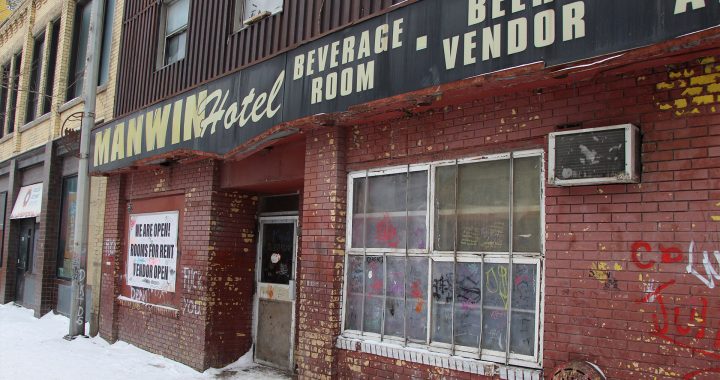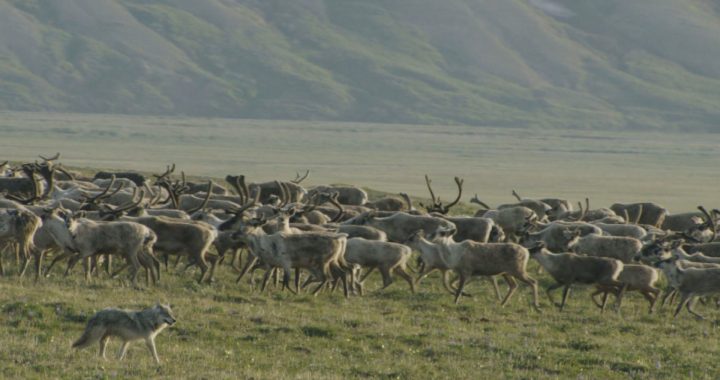
The RCMP emblem on the side of a police cruiser. Photo: APTN News file
Brutality, racism and neglect leading to enduring trauma and an ingrained fear of police are some of the allegations that Indigenous people level against the RCMP in sworn affidavits filed in Federal Court in October 2019.
An Indigenous man with six broken ribs and a punctured lung presumed intoxicated by RCMP and thrown in the drunk tank for 14 hours.
A Dene woman on crutches for six weeks after RCMP slammed the car door on her foot several times during an arrest while her daughter watched and cried: “Mom.”
A Gwich’in man knocked unconscious and concussed, thrown to the ground and dragged into a cell by his feet then beaten by an RCMP officer.
A Dehcho man stripped down to his boxers and thrown into a freezing cold cell, pepper sprayed after a fight and dragged into a hallway with no cameras then kicked all over by four Mounties.
The list goes on.
The court documents recount these and many other incidents as part of a proposed class-action lawsuit that alleges widespread brutality, negligence and systemic discrimination by the RCMP, which enforces the law throughout all three territories.
The claim seeks $600 million in damages for all First Nations, Inuit and Metis in Nunavut, N.W.T., and the Yukon who were harmed by unnecessary use of force by RCMP from 1928 until now.
Read more: Lawyer in $600M RCMP discrimination suit ‘hoping to hear’ from man in Nunavut video
These are all unproven allegations that have not been tested in court. No officers involved have been identified.
In an upcoming virtual hearing, Canada’s lawyers will cross-examine the Indigenous people who swear these attacks happened as stated.
In February federal lawyers filed an affidavit signed by Sarah Shields, a civilian RCMP employee who consulted Police Reporting and Occurrence System (PROS), a database of police reports that records details about calls they attend. Shields pulled the incident reports involving all of the people above but said she only found one report matching the incidents they described.
Michael Payne claims he experienced four different incidents of harassment and discrimination by RCMP between 2008 and 2017 that left him afraid to call the police or even leave the house.
“Dealing with the RCMP in the north feels like you are dealing with a gang,” said Payne in his affidavit. “They protect each other and they often target Indigenous people in the community.”
Payne, whose father is white and mother Indigenous, says he was detained and harassed by RCMP at the airport in his hometown of a Tuktoyaktuk, N.W.T., in 2008. He says the RCMP strip-searched him and told him to “go back where [he] came from.”
Payne says he called the police in 2009 when he was having trouble breathing and believed his ribs were broken after being assaulted in his own home.
“When the RCMP eventually arrived, I had passed out because of the pain. I think they assumed I had passed out drunk, but I was not intoxicated,” he said.
He says he was then detained for 14 hours in the “drunk tank,” confused about being in jail because he was the one who called for help.
“I was yelling out in pain, and telling the officers I couldn’t breathe. I was screaming for help as much as I could. I heard one of the RCMP officers say that I was just faking it and that I was drunk.”
Payne says he was released the next morning and tried to get to the nursing station but collapsed on the way.
“I had to be transported and spent the next month in the Inuvik Hospital. Six of my ribs were broken, and one of my ribs had punctured my lung.”
Payne describes two more arrests that occurred respectively in 2013 and 2017.
He remembers being taunted: “Your eyes are so squinty, why aren’t you in China?”
He says was called a “chink-eyed kid” and a “stupid Eskimo,” among other things.
“When someone is being victimized, I am scared to call the RCMP,” he said. “I want to report it and I want to help people, but I am too scared to go down there because I don’t want to end up in jail.”
Darlene Bugghins, a Dene Woman from Hay River, N.W.T., says multiple incidents with police left her with ongoing pack pain and lasting emotional damages.
In her affidavit, Bugghins says she feared for her safety when she called the Mounties in or around summer of 2000 on her common law partner. She says she “had a few drinks” but wasn’t drunk that day. She describes a violent arrest in front of her seven-year-old daughter.
“When the RCMP attended my home, there were two officers who entered. Upon entering, they immediately came towards me and I was arrested,” she said. “When I was placed in the RCMP vehicle, my foot was not all the way in and the officer slammed the door several times on my ankle. I was yelling out in pain and screaming ‘my foot’, ‘my foot’ and they didn’t stop.”
Bugghins says her daughter witnessed the entire altercation and remembers it to this day. She says the cops left her daughter on the side of the road outside her friend’s house without bringing her in or checking to see if someone was home.
“I ended up on crutches for approximately six weeks because of the injury,” she said.
She claims RCMP arrested her again in 2016 and says the Mounties ignored her multiple times as she told them about a prior back injury after she was placed in a cell with a concrete floor and no mattress.
“I laid on the floor for over six hours, crying out to the RCMP officers that I was in pain and couldn’t move on my own. I was begging for them to help me, and to call an ambulance, but they continued to dismiss me.”
She says she heard a Mountie say “she’s just lying; she’s just another drunk Indian.”
“When RCMP officers finally came to release me, they again told me to get up off the floor. I couldn’t move. The officers had to call an ambulance.”
Bugghins was prescribed pain meds then and still has to take them, she says.
“I am scared of being detained by the RCMP. It is clear to me that they do not care about my health, safety or well-being. I do not trust them to keep me safe.”
These are a few examples. The descriptive allegations of assault continue on.
Anthony Gargan claims he was kicked and brutalized by Yellowknife RCMP in 2009. He says Mounties arrested him without telling him why while he was walking toward a cab after leaving a bar with a friend.
“I kept asking the officers why they were doing this. They told me to shut up, and to take off my clothes. I was placed in a cell with others, with only my boxers on,” he said. “I was freezing cold because the cell was right next to an outside door, and it was winter.”
Gargan says he got into a scuffle with another inmate, at which point they were pepper-sprayed. He says Mounties then threw him on the ground and handcuffed him.
“The officers dragged me to an area in the hallway with no cameras and began kicking me all over my body,” he said. “I did not deserve this kind of treatment, and I don’t believe the RCMP would have treated a non-Indigenous person the same way.”
He says he was released at 5 a.m. the following day, nearly too stiff to walk and requiring care from his sister for the next three days because of the alleged beating.
“It is not uncommon for RCMP officers to assault Indigenous peoples in Yellowknife,” said Gargan. “I left Yellowknife because I did not feel safe with the RCMP officers there.”
These allegations have not been tested and the individuals who made them will be cross-examined later this month, a lawyer representing the class in this claim told APTN News.
An affidavit submitted by Canada’s lawyers says it was not able to find evidence of these events in the police occurrence reports involving all the civilians named here.
Certification is pending for the claim, meaning a judge has not yet determined whether it’s appropriate for this case to proceed as a class action. The certification hearing was set for July 2020 but was pushed back because of the pandemic.
On June 8, APTN requested an interview with RCMP Commissioner Brenda Lucki. It wasn’t granted.
To learn more about the proposed class action click here or call 1-800-994-7477.










